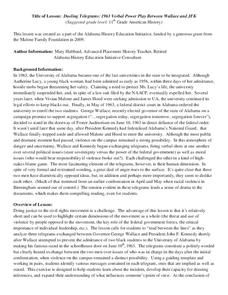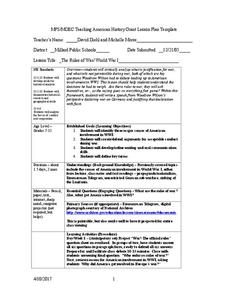Alabama Department of Archives and History
Dueling Telegrams: 1963 Verbal Power Play Between Wallace and JFK
Information, inferences, and innuendos. Text and subtext. Class members examine telegrams exchanged between President John F. Kennedy and Alabama Governor George Wallace, studying both what is stated and what is implied by the...
John F. Kennedy Presidential Library & Museum
Analyzing the Rhetoric of JFK’s Inaugural Address
“And so, my fellow Americans: ask not what your country can do for you—ask what you can do for your. country.” Did you know that John Kenneth Galbraith, Adlai Stevenson, and Theodore Sorensen helped John F. Kennedy craft his 1961...
US National Archives
Eastern Europe 1939-45 — Ukraine
Was Joseph Stalin desperate or exaggerating the USSR's need for assistance on the Eastern Front in 1942? History students examine two differing opinions on Stalin's position and the reality of the Eastern Front just three years before...
US National Archives
WWII: Western Europe 1939-45 – End of the War
You are Winston Churchill, and on May 9th, 1945, you receive millions of grateful cards and telegrams. How do you respond? High schoolers put themselves in the Prime Minister's chair with an activity that prompts them to respond to a...
US National Archives
Eastern Europe 1939-45 — Camps
Britain's decision not to bomb German death camps in World War II has provided many questions for historians, but with a primary source analysis lesson, high school students may be a step closer to finding out the truth. Learners read...
Curated OER
The Rules of War/World War I
Students explore the reasons the United States became involved in World War I. In this World History instructional activity, students research the reasons Woodrow Wilson made the decisions he did, prepare a debate and write a paper.
Curated OER
The Zimmermann Telegram
Young scholars decode a fictitious message and write messages using the code. Students are shown the significance of the creation of the Zimmermann telegram to aid in communication and how it altered history.
Curated OER
"In God We Trust": The Camden Man Who Put the Missing Motto on the Dollar Bill
Here is a fascintating lesson which relates how the motto "In God We Trust" came to appear on all US currency. It turns out that a man from Arkansas came up with the idea and petioned his congressman and President Eisenhower himself to...
Curated OER
Nevada Vocabulary
In this matching terms and phrases worksheet, students use the words in the word bank to fill in the blanks about Nevada. Students write 10 answers.
National History Day
Why Did the United States Enter World War I in 1917?
World War I was the first major conflict on a global scale. Using primary documents, learners determine why the United States chose to enter World War I when it did. After analytical writing and group research, the causes of America's...
Curated OER
Telegram from Senator Joseph McCarthy to President Harry S. Truman
High schoolers research the McCarthy hearings to determine the following: time frame of hearings, how they were broadcast, how the press reacted, and how the American people reacted in light of the Korean Conflict and the Cold War.
Curated OER
Through the Eyes of Al McIntosh
High schoolers examine World War II through the eyes of local journalists such as Al McIntosh. As a class, they discuss how stories about the war affects the public back at home. In groups, they compare and contrast how newspapers...
Curated OER
My Secret War: Lesson 12
Fifth graders explore how the war affected American children. In this social studies lesson, 5th graders discuss how quotes made people feel about the war effort. Students write reflections on their reading.
Curated OER
The U.S. Recognition of the State of Israel
Students research the political aspects of the U.S. position in the Middle East, considering, for example, Truman's position in view of the 1948 presidential election. They examine a telegram sent by the Secretary of State, George C....
Curated OER
Horatio's Drive:Activity Two
Students experience the historic value of personal letters by examining those Horatio Jackson's sent to his wife, Bertha, as well as ones they compose, and then write letters from Bertha to Horatio that reflect her day-to-day life.
Curated OER
An Investigation of Primary and Secondary Sources Using The Records on Mary McLeod Bethune
Students listen to a summary of the life of Mary Bethune. They read or listen to an excerpt from an interview with Mary Bethune. They discuss the differences between the transcript and the draft of the biography.

















